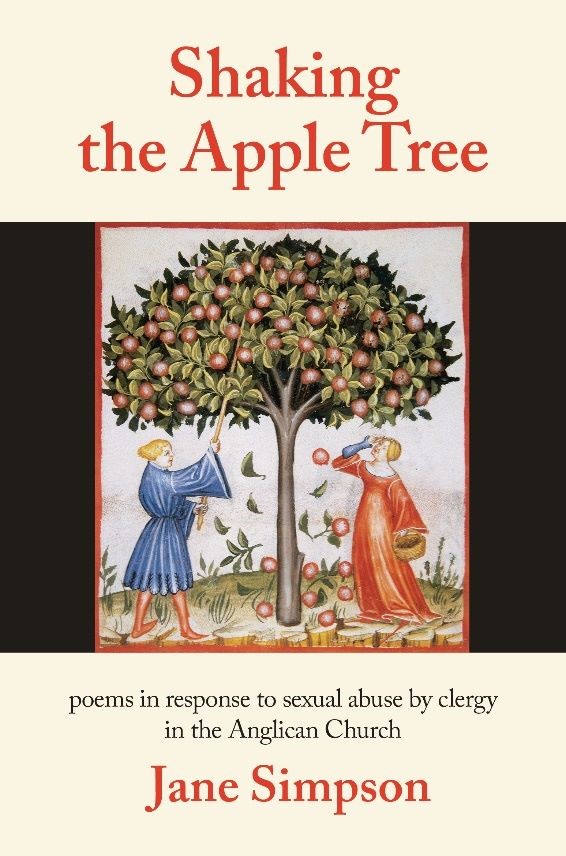Poems in response to sexual abuse by Clergy in the Anglican Church
My hopes are that the book will continue to help the survivors of sexual abuse and hold the Church to account. Judge Coral Shaw, Chair of the Royal Commission of Inquiry into Abuse in Care said to me: ‘I welcome such creative endeavours to keep the voices of victims and survivors to the fore.’ Long may poetry endure.
Jane Simpson’s collection of poems has been received to pastoral and critical acclaim.

The Dean of Christ Church Cathedral, Ben Truman says:
I’m so thankful for Jane Simpson’s contribution to the conversation in her excellent collection, “Shaking the Apple Tree: Poems in response to sexual abuse by clergy in the Anglican Church.” Poetry is the art form required to hold that tension of dark and light, to digest the complexities, to wrestle with the themes, to offer up snapshots that are at once both brutally specific and universal. Her poetry draws on and goes beyond the work of the Commission in giving a voice to the voiceless, and shining a disinfecting light into the dark corners of our church. m thankful for this gift to the church … It takes the personal and magnifies it to the universal. It helped me to better hear our painful stories, and to better heal from them. I commend the book to all.’ https://anglicantaonga.org.nz/culture/books/shakingappletree_review
Kimberly K. Williams says: ‘This book is not easy to read, nor should it be. Indeed, to gain both a wide and personal sense of the effects of years of abuse by Anglican clergy, Simpson’s Shaking the Apple Tree is indispensable and a worthy read.
Kimberly Williams writes for London Grip https://londongrip.co.uk/2024/11/london-grip-poetry-review-jane-simpson/
Jane Simpson’s Shaking the Apple Tree is a book that serves as a kind of reckoning, addressing the impact of years of sexual abuse by Anglican priests and a Church administration that failed to deal with it appropriately. These poems bear witness to the abuse that both named and nameless women have suffered; as such, it is more than a book about what might have happened to an individual. Indeed, the poems are much wider in their collective scope and as such function as witness poems – speaking for a collective or whole.
Witness poetry as a recognised form of creative activism first took firm hold at the end of the twentieth century with the publication, in 1993, of the first anthology of witness poems, edited by Carolyn Forché, Against Forgetting: Twentieth Century Poetry of Witness. As the anthology’s title indicates, one main role of witness poetry is to keep the human struggles of the past in present memory via the space and voice of a poem. This specific role that poetry performs does the opposite of what many governments and, in this case, religious administrations do: instead of covering trauma, it exposes it through language and image, holding a space for those affected while informing readers of transgressions that may have been hidden. It is a tall task, and Simpson’s poems take it on deliberately. The book’s introduction addresses this point itself: “As it has always done, poetry employs symbolism and metaphor to express trauma in ways listeners and readers can immediately identify with. Imagined accounts based on historical evidence have the emotional power to break through the conspiracy of silence surrounding sexual abuse”. Here is an apt description of one role of witness poetry and the way that it can work. And, with this statement, the reader can be sure of Simpson’s deliberate approach.
London Grip Poetry Review – Jane Simpson
Jane comments: This is especially topical given the apology this week 18 Nov 2024) of the Prime Minister, Christopher Luxon, for the abuse of hundreds of thousands of people in state care. Our headlines have also been filled with the story of the resignation of the Archbishop of Canterbury, Justin Welby, for taking insufficient action to stop one of the Church’s most prolific serial abusers.
Jane Simpson reads from her collection here.


